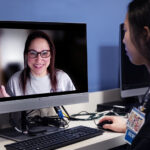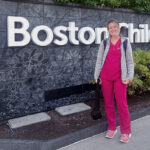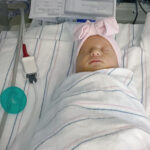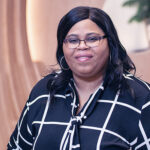“Observe. Be open.”: How Boston Children’s nurses are changing the future of global health
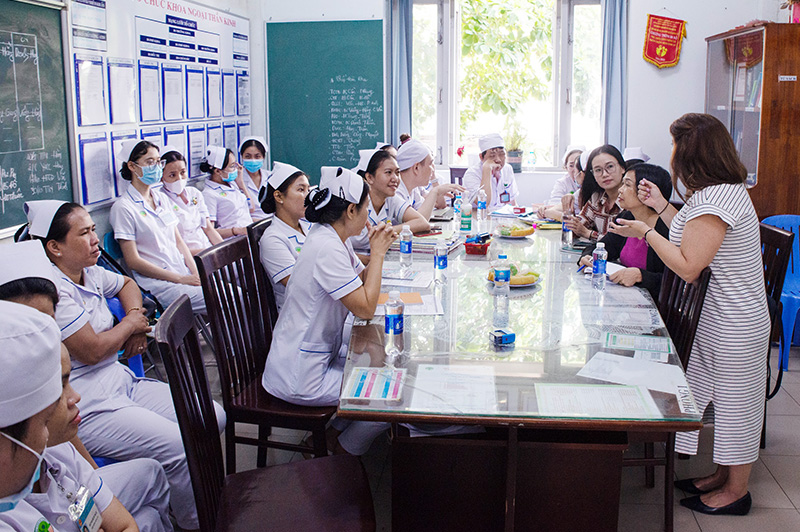
Ashley Birch, MSN, CPNP, a Boston Children’s pediatric nurse practitioner and Global Nursing fellow, didn’t expect a trash bag to become a critical tool in her global health toolkit.
In a hospital in Uganda, caring for a baby with spina bifida, Ashley improvised and created a protective covering over a wound using what she thought of as a “mud flap” — a clean square of plastic fashioned from a trash bag, carefully taped in place to help protect a healing incision from infection. “Unused, clean trash bags are made of a similar material to the ‘mud flaps’ we use at home,” she says. “It’s such a simple thing, but it was really helpful: an infection-preventive measure and practical nursing innovation. Seemingly simple solutions such as this are a mainstay of nursing practice — our bread and butter.”
Neonatal intensive care unit (NICU) nurse Deborah O’Dowd, MSN, RN, CCRN, another Global Nursing fellow, brings a different kind of skill to the bedside: teaching neonatal resuscitation to nurses in Liberia and Lesotho. Part of her work involves spending time in NICU settings outside of the U.S. to understand local realities firsthand. “You can’t really teach something if you don’t see and understand [the context in which it will be used],” she says.
Boston Children’s Global Nursing Fellowship (GNF) was launched in 2015 as the first pediatric nursing fellowship of its kind in the U.S. This year marks the program’s 10th anniversary and a decade of advancing patient care worldwide. The fellowship was created from a simple but profound insight: “You can’t improve the delivery of pediatric care globally without nurses,” says Lisa Morrissey, MPH, MSN, RN, NE-BC, co-director of the GNF. “Nursing is the largest workforce in health care, and so much about patient outcomes and patient care is intertwined with and strengthened through nursing.”
Central to the fellowship is a collaborative approach, built on sustained relationships and guided by local health teams’ needs and goals. It’s an approach that empowers nurses like Ashley and Deborah to make a meaningful difference.
From simple question to global impact
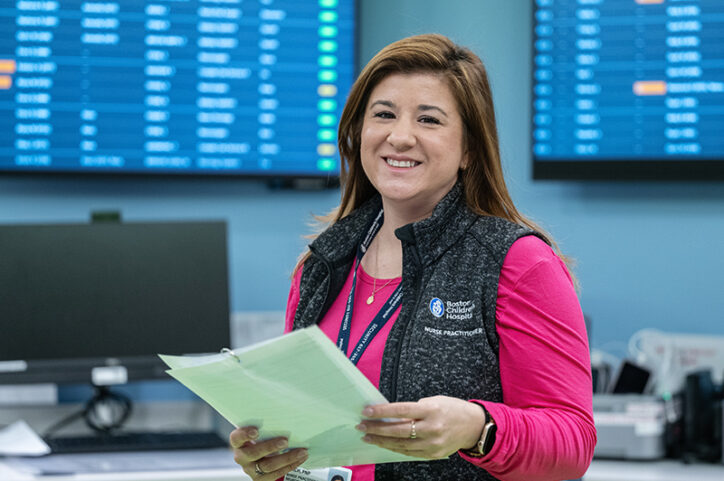
Ashley’s path to global nursing began with a question. After hearing Dr. Benjamin C. Warf, director of Neonatal and Congenital Anomaly Neurosurgery at Boston Children’s, speak about returning to a hospital he’d founded in Uganda, she asked: “Could they use someone like me? Could I help in any way there?” His answer was an enthusiastic yes.
That question evolved into multiple site visits, a nursing fellowship, and eventually co-founding NeuroKids, a nonprofit organization that helps children with hydrocephalus and spina bifida live longer, better lives. “We’ve been to Egypt, Brazil, Kenya, Zambia…” says Ashley. “We travel to a wide range of locations around the world, do a site assessment to kind of figure out what the need is, and then support nurses and care teams by providing education prioritized by local teams.”
At the heart of Ashley’s work is nurse education, delivered not only through didactic lectures, but rather through hands-on, side-by-side direct care experiences on the ward — sometimes almost simultaneously. One day, after giving a lecture on wound care that included the “mud flap” technique, Ashley was approached by nurses caring for a baby with myelomeningocele, a severe form of spina bifida in which part of the spinal cord and nerves develop outside the body. “They asked, ‘Can you please show us how to do the technique on this baby?’” Ashley recalls. “I ended up in the middle of this circle of nurses who were just watching me demonstrate this very simple procedure. It ended up being really helpful.”
Empowering nurses through shared learning
Deborah’s path to global nursing has been shaped by adaptability and deep commitment. When her original fellowship plans to travel to Haiti fell through due to political unrest, she redirected her training and support efforts to Liberia and Lesotho, where medical resources are also limited.
“The nurses I train know the right things to do,” she explains, “but they don’t have the resources to give the care they want to give. Emotionally, it’s really difficult.” In one hospital, she recalls, two or three nurses were responsible for as many as 30 newborns, a stark contrast to the much lower nurse-patient ratios back home. “It’s everything: staffing resources, supplies, all of it,” she says. “They’re doing so much with so little.”
In addition to educating, Deborah makes a point to listen, observe, and understand what local teams need most. She adapts her teaching to meet the needs of each setting, supporting whoever is seeking guidance — from nurse midwives to community health workers, and beyond. Now a doctoral student in public health, she continues to return to Liberia and remains deeply involved in the work she began during her fellowship.
Transforming care abroad and at home
Ashley and Deborah’s global work transformed their approach to patient care — not just overseas, but also back in Boston.
“It helped me realize how important my communication and relationship-building skills were,” Ashley says. “It also highlighted how I might continue to strengthen how I work with families, with patients, and with my own nursing colleagues.”
Deborah describes a similar shift in mindset: “It definitely makes me more thoughtful about my practices when I’m using resources,” she says. “So many other places are resource limited. I try to be more thoughtful about the way I use things.”
Lisa sees this transformation as key to the fellowship’s impact. “All Boston Children’s nurses do global work because we routinely care for so many patients from around the world,” she says. “It’s not just about improving care over there. It’s about making us better nurses here.”
Building a network, shaping the future
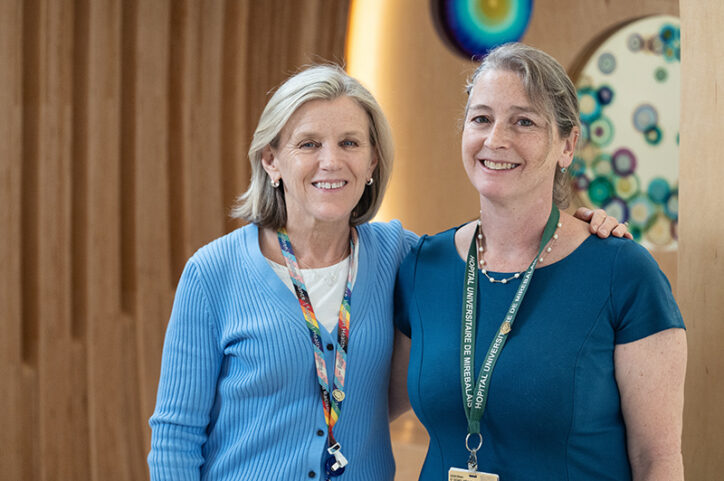
Today, the Global Health nursing fellowship continues to grow. Nearly all its registered nurse and nurse practitioner alumni are still working at Boston Children’s. And many, including Ashley and Deborah, are mentors to new fellows or hold extended positions, made possible through the Maggie C. Ryan Endowed Fellowship in Global Health. “We’re building a network of global health nurses,” Lisa says. “And I can see the influence expanding beyond the fellowship to other nurses at Boston Children’s.”
Through their experiences abroad, Global Nursing fellows face unique challenges that shape their resilience and professional growth. These challenges include navigating limited resources and stark differences in access to care. As a result, Boston Children’s nurses return home with both newfound skills and a renewed sense of purpose.
Ashley notes, “While you can read about health care needs around the world, it’s important to experience the resilience and commitment demonstrated within so many settings around the world to fully use existing resources. What you need to know ahead of time is this: You can’t fix everything — but there’s so much you can do. Observe. Be open. You’re going to learn and be changed as a person with new respect for the dignity of others and cultures around the world.”
Learn more about our Global Nursing Fellowship
The Maggie C. Ryan Endowed Fellowship in Global Health was established to honor the legacy of Maggie Ryan, an extraordinary young woman and former intern with the Global Health Program.
Related Posts :
-

Nurse-led innovations: A virtual-nursing pilot helps nurses thrive
It was night shift on the 9E Inpatient Medical Unit and Marisol Hernandez, BSN, RN, CPN, was helping another nurse ...
-

‘The reason I became a nurse’: Maeve’s memories of laryngeal cleft repair
Being a gastroenterology nurse is more than a profession for Maeve Lee. When she cares for patients with feeding tubes, ...
-

I’ve been there, too: What my baby’s tumor taught me as a NICU nurse
I had a toddler at home when I found out I was pregnant with my twins, Hannah and Sophie. Since ...
-

Nurses Week 2022: Leading the way in advancing nursing documentation
Boston Children’s Hospital nurses are dedicated to providing high-quality care to patients and families, which is best accomplished through ...


